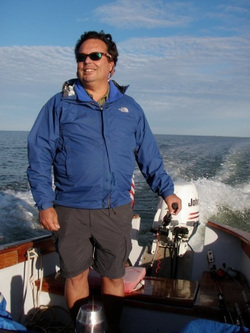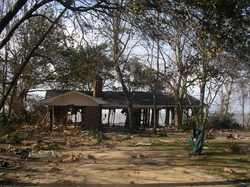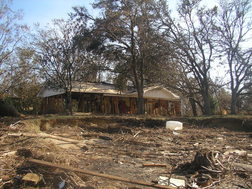Mississippi Katrina Survivor Looks Back after 5 Years

Arthur Pontas on his boat.
December 4, 2010
Ms. Melissa Hootselle's 11th and 12th grade ESOL classes interviewed Mr. Arthur Pontas on November 29th about his experiences with Hurricane Katrina and his reflections on the five-year anniversary of the storm. This feature article was written as a joint effort by both classes as part of a unit of work on Spike Lee's When the Levees Broke.
Arthur Pontas evacuated his boarded home in Gautier, MS on Sunday, August 28th, 2005 at 6pm. He filled up several five-gallon gas tanks, grabbed his generator, and headed north. He thought Hurricane Katrina was heading for south Louisiana. Instead, it took a last-minute turn to the east. Nobody thought Katrina could be worse than Camille. Residents imagined the high waters would not rise more than Camille’s 24 feet reported by the National Hurricane Center. According to NOAA, Katrina’s storm surge rose to 28 feet. Mr. Pontas returned to a gutted shore-front home on Tuesday morning. He had his life and his family, but nothing else-no furniture, clothes, tools, family photos. His front yard was gone. A 50 x 100 foot space of dirt, trees, and grass disappeared.
In the days after the storm, Mr. Pontas felt lost and fell into depression. He helped friends remove rotting drywall and soggy carpet. He looked in debris piles for his belongings. Federal response on the Mississippi coast was slow. Mr. Pontas reflected, “The administrators and bureaucrats had no idea how bad it really was.” Critics of the Bush administration claim that the federal government did know how bad it was, but delayed action to avoid blame. Bush instead chose to wait upon the decision of Governor Blanco in a political power struggle. The Bush Administration in turn blamed state and local officials for the lack of federal action, according to Michael E. Dyson, author of Come Hell or High Water: Hurricane Katrina and the Color of Disaster. Mr. Pontas received some financial support from the Federal government. After six weeks, he received a FEMA trailer which “sure beat a tent!” Helicopters dropped supplies from 50 feet which went to waste after smashing to the ground.
Arthur Pontas described the emotional climate as, “Sad, depressing, a feeling of abandonment. Everywhere was destruction and mayhem. There were no more "familiar" items. We were striving for normalcy. We found it in many ways and rejoiced at the smallest of victories.” Mr. Pontas calls the lack of response to the psychological damage of the people a failure of the federal government.
One problem for Mississippians was the amount of media attention devoted to New Orleans, while reports featuring their state were few. Mr. Pontas reflects, “There was media bias looking for the worst and grandstanding. New Orleans survived the storm, the levee failed and it had a quiet flood. The MS Coast got hammered, plain and simple. I am not happy with the media bias that I saw. It has hardened my view of the mainstream media and made me very skeptical of anything they say or do these days. I do not trust them.” The effects of Katrina on the City of New Orleans and its people were obviously more than a mild flood. The New Orleans Times Picayune reported on May 19, 2006 that the death toll in Louisiana was 1,577. The death toll in Mississippi was 238, according to NOAA’s updated report in August 2006. However, comparing numbers is not helpful when it comes to human pain.
The feeling of abandonment of Mississippi gulf coast residents was made worse by the lack of media attention. The Mississippi Sun Herald was awarded a Pulitzer Prize in journalism for its December 14, 2005 article, “Mississippi’s Invisible Gulf Coast” which pleaded with the media, “Please, tell our story. Hear the voice of our people and tell it far and wide. We are here. Do not forsake us. We are no footnote. “ Mr. Pontas was among the many residents who felt, “lost, lonely, neglected and forgotten.”
Arthur Pontas has a hard-won sense of determination, “Eventually I became determined and a bit tougher and refuse to take no for an answer these days. The HELL with no, I'll find another way. Don't cross me, I'm determined I will prevail. I'm far stronger now than I was 5 years ago, but it took a few years to get there.” Mr. Pontas feels that the lack of media response led to a weaker response from aid agencies and the government. “But then it (the lack of response) tended to strengthen our resolve and make us bootstrap ourselves back up. It is a blessing not to 'need' the government. We have learned the difference between needs and wants. Our needs are actually small: shelter, water, food and a loving family and friends sure fill the gap when all has been lost.”
Mr. Pontas has still not completed rebuilding his home five years later. Mr. Pontas works for oil companies as a drilling engineer. The effects of Katrina and the poor economy left him without work for much of the last three years. Rebuilding has been slow as a result. Builders who know how to build according to the new codes are hard to come by and work multiple jobs at a time. Despite the challenges, Arthur Pontas and the people of Mississippi are strong, self-reliant, and determined. Mr. Pontas voiced the resilience of Mississippians when asked what he learned from Katrina, “Be grateful for family and sharing, and be prepared. Take responsibility for one’s own self. Have cash, have fuel, have food, have water, have more whiskey, have more fun--carpe' diem!”
(Sources are cited in context according to journalistic style)
Ms. Melissa Hootselle's 11th and 12th grade ESOL classes interviewed Mr. Arthur Pontas on November 29th about his experiences with Hurricane Katrina and his reflections on the five-year anniversary of the storm. This feature article was written as a joint effort by both classes as part of a unit of work on Spike Lee's When the Levees Broke.
Arthur Pontas evacuated his boarded home in Gautier, MS on Sunday, August 28th, 2005 at 6pm. He filled up several five-gallon gas tanks, grabbed his generator, and headed north. He thought Hurricane Katrina was heading for south Louisiana. Instead, it took a last-minute turn to the east. Nobody thought Katrina could be worse than Camille. Residents imagined the high waters would not rise more than Camille’s 24 feet reported by the National Hurricane Center. According to NOAA, Katrina’s storm surge rose to 28 feet. Mr. Pontas returned to a gutted shore-front home on Tuesday morning. He had his life and his family, but nothing else-no furniture, clothes, tools, family photos. His front yard was gone. A 50 x 100 foot space of dirt, trees, and grass disappeared.
In the days after the storm, Mr. Pontas felt lost and fell into depression. He helped friends remove rotting drywall and soggy carpet. He looked in debris piles for his belongings. Federal response on the Mississippi coast was slow. Mr. Pontas reflected, “The administrators and bureaucrats had no idea how bad it really was.” Critics of the Bush administration claim that the federal government did know how bad it was, but delayed action to avoid blame. Bush instead chose to wait upon the decision of Governor Blanco in a political power struggle. The Bush Administration in turn blamed state and local officials for the lack of federal action, according to Michael E. Dyson, author of Come Hell or High Water: Hurricane Katrina and the Color of Disaster. Mr. Pontas received some financial support from the Federal government. After six weeks, he received a FEMA trailer which “sure beat a tent!” Helicopters dropped supplies from 50 feet which went to waste after smashing to the ground.
Arthur Pontas described the emotional climate as, “Sad, depressing, a feeling of abandonment. Everywhere was destruction and mayhem. There were no more "familiar" items. We were striving for normalcy. We found it in many ways and rejoiced at the smallest of victories.” Mr. Pontas calls the lack of response to the psychological damage of the people a failure of the federal government.
One problem for Mississippians was the amount of media attention devoted to New Orleans, while reports featuring their state were few. Mr. Pontas reflects, “There was media bias looking for the worst and grandstanding. New Orleans survived the storm, the levee failed and it had a quiet flood. The MS Coast got hammered, plain and simple. I am not happy with the media bias that I saw. It has hardened my view of the mainstream media and made me very skeptical of anything they say or do these days. I do not trust them.” The effects of Katrina on the City of New Orleans and its people were obviously more than a mild flood. The New Orleans Times Picayune reported on May 19, 2006 that the death toll in Louisiana was 1,577. The death toll in Mississippi was 238, according to NOAA’s updated report in August 2006. However, comparing numbers is not helpful when it comes to human pain.
The feeling of abandonment of Mississippi gulf coast residents was made worse by the lack of media attention. The Mississippi Sun Herald was awarded a Pulitzer Prize in journalism for its December 14, 2005 article, “Mississippi’s Invisible Gulf Coast” which pleaded with the media, “Please, tell our story. Hear the voice of our people and tell it far and wide. We are here. Do not forsake us. We are no footnote. “ Mr. Pontas was among the many residents who felt, “lost, lonely, neglected and forgotten.”
Arthur Pontas has a hard-won sense of determination, “Eventually I became determined and a bit tougher and refuse to take no for an answer these days. The HELL with no, I'll find another way. Don't cross me, I'm determined I will prevail. I'm far stronger now than I was 5 years ago, but it took a few years to get there.” Mr. Pontas feels that the lack of media response led to a weaker response from aid agencies and the government. “But then it (the lack of response) tended to strengthen our resolve and make us bootstrap ourselves back up. It is a blessing not to 'need' the government. We have learned the difference between needs and wants. Our needs are actually small: shelter, water, food and a loving family and friends sure fill the gap when all has been lost.”
Mr. Pontas has still not completed rebuilding his home five years later. Mr. Pontas works for oil companies as a drilling engineer. The effects of Katrina and the poor economy left him without work for much of the last three years. Rebuilding has been slow as a result. Builders who know how to build according to the new codes are hard to come by and work multiple jobs at a time. Despite the challenges, Arthur Pontas and the people of Mississippi are strong, self-reliant, and determined. Mr. Pontas voiced the resilience of Mississippians when asked what he learned from Katrina, “Be grateful for family and sharing, and be prepared. Take responsibility for one’s own self. Have cash, have fuel, have food, have water, have more whiskey, have more fun--carpe' diem!”
(Sources are cited in context according to journalistic style)



